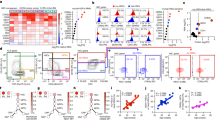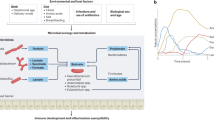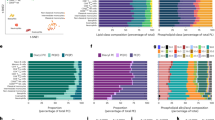Abstract
SEVERAL environmental contaminants have been demonstrated to be synergistic to infectious agents. Polychlorinated biphenyls1, arsenicals2, cobalt sulphate3 and sulphur dioxide4 increased the mortality of animals infected with viral agents. Lead nitrate enhanced the mortality of mice to Salmonella typhimurium5. Some of these compounds are apparently immunosuppressive as circulating antibody titres to infectious agents from animals exposed to lead, cadmium, mercury6, DDT (ref. 7) and polychlorinated biphenyls8 were significantly lower than those from the control animals. This study was undertaken to determine if the decreased circulating antibody in animals that were exposed to lead was a result of a decrease in the number of cells producing antibody.
This is a preview of subscription content, access via your institution
Access options
Subscribe to this journal
Receive 51 print issues and online access
$199.00 per year
only $3.90 per issue
Buy this article
- Purchase on Springer Link
- Instant access to full article PDF
Prices may be subject to local taxes which are calculated during checkout
Similar content being viewed by others
References
Friend, M., and Trainer, D. O., Science, 170, 1314 (1970).
Gainer, J. H., and Pry, T. W., Am. J. vet. Res., 33, 2299 (1972).
Gainer, J. H., Am. J. vet. Res., 33, 2067 (1972).
Fairchild, G. A., Roan, J., and McCarroll, J., Arch. environ. Hlth, 25, 174 (1972).
Hemphill, F. E., Kaeberle, M. L., and Buck, W. B., Science, 172, 1031 (1971).
Koller, L. D., Am. J. vet. Res., 34, 1457 (1973).
Wassermann, M., Wassermann, D., Kedar, E., and Djauaherian, M., Bull. environ. Contam. Tox., 6, 426 (1971).
Koller, L. D., and Thigpen, J. E., Am. J. vet. Res., 34, 1605 (1973).
Schroeder, H. A., Balassa, J. J., and Vinton, W. H., J. Nutrition, 36, 51 (1965).
Cunningham, A. J., and Szenberg, A., Immunology, 14, 599 (1968).
Trejo, R. A., DiLuzio, N. R., Loose, L. D., and Hoffman, E., Exp. molec. Path., 17, 145 (1972).
Zarkower, A., Arch. envir. Hlth, 25, 45 (1972).
Chisolm, J. J., Scient. Am., 224, 15 (1971).
Goyer, R. A., Am. J. Path., 64, 167, (1971).
Goyer, R. A., et al., Lab. Invest., 22, 245 (1970).
Choie, D. D., and Richter, G. W., Science, 177, 1194 (1972).
Author information
Authors and Affiliations
Rights and permissions
About this article
Cite this article
KOLLER, L., KOVACIC, S. Decreased antibody formation in mice exposed to lead. Nature 250, 148–150 (1974). https://doi.org/10.1038/250148a0
Received:
Issue Date:
DOI: https://doi.org/10.1038/250148a0
This article is cited by
-
Immunity in children with exposure to environmental lead: II. Effects on humoral immunity
Environmental Geochemistry and Health (1994)
-
Lead accumulation during aging of Drosophila and effect of dietary lead on life span
AGE (1992)
-
Immunotoxicology: suppressive and stimulatory effects of drugs and environmental chemicals on the immune system
Archives of Toxicology (1989)
-
Autointerference in silver accumulation in macrophages without affecting phagocytic, migratory or interferon-producing capacity
Virchows Archiv B Cell Pathology Including Molecular Pathology (1987)
-
Influence of chronic low-level exposure to lead on plasma immunoglobulin concentration and cellular immune function in man
International Archives of Occupational and Environmental Health (1986)
Comments
By submitting a comment you agree to abide by our Terms and Community Guidelines. If you find something abusive or that does not comply with our terms or guidelines please flag it as inappropriate.



